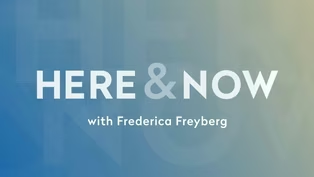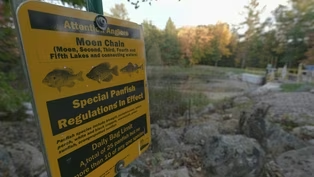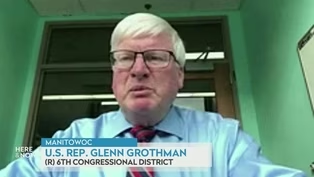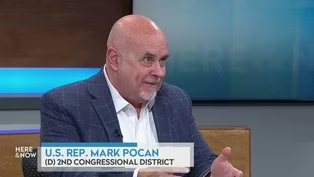Here and Now
Chancellor Jennifer Mnookin on Civil Discourse at UW-Madison
Clip: Season 2400 Episode 2416 | 5m 14sVideo has Closed Captions
Jennifer Mnookin on a program to support dialogue amid free speech concerns on campus.
UW-Madison Chancellor Jennifer Mnookin discusses the launch and goals of the Wisconsin Exchange, a program seeking to support civil dialogue at the university amid free speech controversies on campus.
Problems playing video? | Closed Captioning Feedback
Problems playing video? | Closed Captioning Feedback
Here and Now is a local public television program presented by PBS Wisconsin
Here and Now
Chancellor Jennifer Mnookin on Civil Discourse at UW-Madison
Clip: Season 2400 Episode 2416 | 5m 14sVideo has Closed Captions
UW-Madison Chancellor Jennifer Mnookin discusses the launch and goals of the Wisconsin Exchange, a program seeking to support civil dialogue at the university amid free speech controversies on campus.
Problems playing video? | Closed Captioning Feedback
How to Watch Here and Now
Here and Now is available to stream on pbs.org and the free PBS App, available on iPhone, Apple TV, Android TV, Android smartphones, Amazon Fire TV, Amazon Fire Tablet, Roku, Samsung Smart TV, and Vizio.
Providing Support for PBS.org
Learn Moreabout PBS online sponsorshipmessiness.
And it just needs to stop.
>> All right.
Congressman Pocan thanks for your time.
>> Sure.
Thank you.
>> UW-Madison has announced a new program designed to foster and strengthen civil dialog across the university.
It's called the Wisconsin Exchange joining us now to talk about the program is Chancellor Jennifer Mnookin.
Thanks for your time today.
>> Thanks for having me.
>> So so what is the Wisconsin Exchange?
is a collection of programs and opportunities for students, as well as faculty and staff, to gain experience in engaging with each other across their differences, whether those differences come as differences in background or identity or viewpoint and perspective.
We already had a number of things happening on campus around this, but we wanted to to grow those further because I think it's a significant priority for our campus and frankly, for our nation.
>> So Republicans have criticized UW-Madison for liberal professors.
Making young conservatives feel uncomfortable on campus.
Is this a response to those types of complaints?
>> This is actually something that I think is deeper and far broader.
I think that universities are perfect places for people to learn from, and to learn to talk to people who experience the world differently from the way that they do.
That goes all the way back to sifting and winnowing a core idea at UW-Madison.
And I think we do a fair amount of that already.
And I also think there are opportunities to be more intentional about it, and also to give people practice and skills.
Many people these days live in relatively siloed environments in terms of viewpoint and perspective, and we want people to get out of their silos and have the experience of learning from and talking to each other.
materials.
It doesn't look requirement, not like a freshman class.
So how do you get the people that may need this the most to actually buy into it?
>> That's a fair question, and I think we're frankly starting out with a coalition of the willing.
We're starting out with people who are interested in doing this.
It won't reach everybody on our very large, pluralistic campus from the get go.
We already have programs like the deliberation dinners, where 375 of our undergraduates are raising their hands to come together for six dinners across the year in groups of ten that are selected for viewpoint diversity, to gain skill and practice.
In talking about pretty contentious issues and learning that you can learn from people who see the world very differently from themselves, that's grown over the past couple of years each year.
And in fact, we had more people who wanted to participate this year than we could than we could include.
And these additional programs will at first be for those who are interested, I hope down the road that we might be able to grow some trainings in other spaces around the university and reach even more students, as well as faculty and staff.
>> So in recent years, we've seen student protesters take over over Gaza.
We've seen conservative groups book speakers accused of hate speech.
How would this program deal with those types of environments?
>> Well, I mean, in some ways, protest is part of free speech.
It's absolutely permitted under the First Amendment that you can also have time, space, time, place and manner rules that limit it.
Similarly, we've had many speakers from across the political spectrum, including very conservative speakers, as well as very left leaning ones who've come to campus and shared their views with people who are interested in hearing from them without incident.
I think that is absolutely part of what needs to happen on a university campus.
We also need more opportunities for people who disagree with each other to show that they can do that diplomatically, respectfully, not necessarily succeeding in changing each other's mind.
But but when you hear from someone with a different point of view, sometimes it does change your mind.
Other times it sharpens and focuses your own arguments.
I hear that just before me on this show, you had two congressmen from opposite sides of the aisle talking to each other.
That's a perfect example.
>> So in August, the university lost a free speech case in a federal court filed by a woman who said the UW was blocking her speech on social media channels.
How does moderation of speech on social media work with civil discourse in the public space?
Because often that speech is overlapping.
>> Yeah.
I mean, I think that we need to have robust dialog in all the different spaces that are available.
I don't, frankly, find that social media is the most useful or valuable space for having civic engagement across our differences.
I think that often on social media, people are more interested in in, in supporting their existing point of view, rather than bringing curiosity and compassion to their engagement with one another.
So I don't see this initiative as terribly connected to the social media space of it all.
It's much more about in real life and perhaps virtually giving people opportunities to be part of conversations.
>> All right, Chancellor Mnookin, thanks for your time today.
>> Thank you so much for having me.
[MUSIC] >> We wanted to ask the Chancellor about the state of the UW athletic department and head football coach, Luke Fickell.
Chancellor Mnookin wanted to keep the focus on
Here & Now opening for October 24, 2025
Video has Closed Captions
Clip: S2400 Ep2416 | 54s | The introduction to the October 24, 2025 episode of Here & Now. (54s)
The Northern Wisconsin Town of Stella Demands Action on PFAS
Video has Closed Captions
Clip: S2400 Ep2416 | 7m 53s | Residents of a lake community with PFAS contamination are seeking support from the state. (7m 53s)
US Rep. Glenn Grothman on 2025 Government Shutdown Politics
Video has Closed Captions
Clip: S2400 Ep2416 | 6m 21s | Glenn Grothman on the federal government shutdown and political stance of Republicans. (6m 21s)
US Rep. Mark Pocan on 2025 Government Shutdown Politics
Video has Closed Captions
Clip: S2400 Ep2416 | 5m 50s | Mark Pocan on the federal government shutdown and political stance of Democrats. (5m 50s)
Providing Support for PBS.org
Learn Moreabout PBS online sponsorship
- News and Public Affairs

Top journalists deliver compelling original analysis of the hour's headlines.

- News and Public Affairs

FRONTLINE is investigative journalism that questions, explains and changes our world.












Support for PBS provided by:
Here and Now is a local public television program presented by PBS Wisconsin



